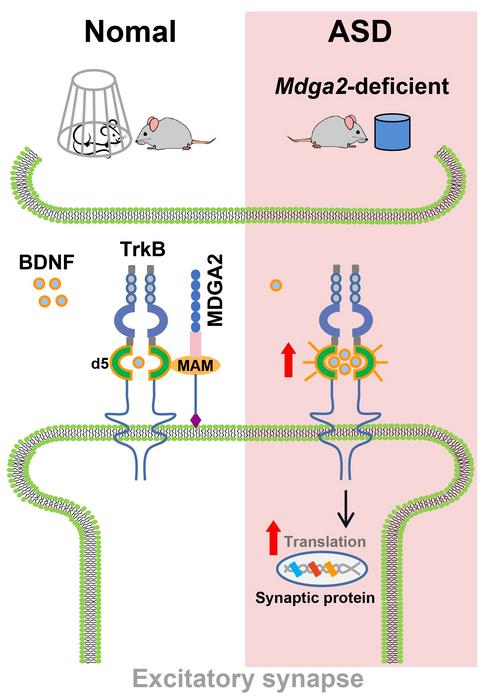In a groundbreaking study published in the esteemed journal PLOS Biology, researchers have shed new light on the intricate biological mechanisms associated with Autism Spectrum Disorder (ASD). The research team, led by Dongdong Zhao from Wenzhou Medical University, has explored the role of competing neuronal proteins in the emergence of autism-like behaviors in mice. This pivotal work, released on April 1, 2025, opens new avenues for understanding ASD and presents potential therapeutic targets for alleviating its symptoms.
Autism Spectrum Disorder affects an estimated 1% of the global population, presenting a spectrum of social and cognitive challenges. Despite extensive research, the connection between genetic predispositions and the clinical manifestation of autism remains elusive. The study by Zhao and colleagues seeks to bridge this gap by scrutinizing the interplay between two neuronal proteins: MDGA2 and BDNF (Brain-Derived Neurotrophic Factor). They provide experimental evidence suggesting that an imbalance between these proteins may trigger the behavioral symptoms associated with ASD.
Central to their investigation is MDGA2, a protein known to facilitate nerve signal transmission. Researchers have previously linked genetic mutations in the MDGA2 gene to ASD cases in humans. This study’s critical finding was that mice engineered to express lower levels of MDGA2 exhibited behaviors reminiscent of autism, including repetitive grooming patterns and variations in social interaction. These behaviors underscore the profound impact of MDGA2 deficiency on neuronal function and highlight the necessity of maintaining a delicate equilibrium in neuronal signaling.
Furthermore, the researchers observed that the MDGA2-deficient mice displayed heightened excitability in nerve synapses, along with elevated levels of BDNF, a protein crucial for neuronal survival and growth. BDNF operates by binding to the TrkB receptor, triggering a cascade of cellular events essential for neuronal health. The experimental protocols utilized in the study involved administering an artificial peptide that mimicked MDGA2’s function, successfully inhibiting BDNF/TrkB signaling and resulting in a reduction of autism-like symptoms in the MDGA2-deficient mice.
Zhao and colleagues posited that MDGA2 and BDNF interact as counter-regulatory factors, vying for access to TrkB binding sites. This competition is vital for the regulation of excitatory neuronal activity. When either of these proteins is dysregulated, as seen in the MDGA2-deficient mice, a cascade of neurobiological repercussions can unfold, leading to the maladaptive behaviors characteristic of ASD. The findings suggest that restoring this balance may offer a new therapeutic strategy for treating autism-related symptoms.
The implication of these findings extends beyond laboratory settings; they offer a physiological framework for developing pharmacological interventions aimed at modulating MDGA2 and BDNF activities. As the authors reveal, further inquiries into the exact roles that MDGA2 and BDNF play in neuronal signaling could reshape the landscape of autism research. Understanding the balance between these proteins could pave the way for identifying specific biomarkers for ASD, thus enhancing diagnostic precision and treatment protocols.
Yun-wu Zhang, a co-author on the study, emphasized the importance of this work in elucidating the obscure relationship between MDGA2 mutations and the clinical phenotype of autism. By highlighting the anomalous activation of the BDNF/TrkB pathway in the face of MDGA2 deficiency, the study provides a clearer picture of how genetic factors can crystallize into observable behavioral phenotypes. The researchers stress that continuing research in this domain is critical for unlocking new therapeutic options for individuals living with autism.
Additionally, the research team’s findings represent an intersection of genetics and neurobiology, suggesting that addressing protein imbalances may hold the key to managing ASD symptoms. While the study focuses on a mouse model, the underlying principles may have significant implications for understanding ASD in humans, particularly with regard to personalized treatment plans predicated on genetic profiling and protein behavior.
As scientific inquiry continues to unveil the complexities of ASD, this study serves as a clarion call for further exploration into the molecular underpinnings of autism. The dynamic interplay between MDGA2 and BDNF not only holds the potential for therapeutic insights but also propels a deeper understanding of neuronal health and its influence on cognitive and behavioral outcomes.
The authors have robustly documented their methodologies, lending credence to their findings through rigorous experimental designs. Their work underscores the necessity of approaching autism research with a multi-faceted lens, where gene-protein interactions are scrutinized with the highest degree of scientific rigor. This progressive trajectory in autism research heralds a transformative era where nuances in protein-level interactions could unveil the most elusive aspects of ASD.
In summation, this research not only provides essential insights into the neurobiological bases of autism but also highlights an urgent need for innovative therapeutic strategies that can effectively address the challenges posed by this complex disorder. The implications of the findings resonate across various disciplines, mapping new territories for investigation and offering hope for improved outcomes for individuals impacted by autism.
In your coverage, please use this URL to provide access to the freely available paper in PLOS Biology: https://plos.io/4hJ3amN
Subject of Research: Animals
Article Title: Mdga2 deficiency leads to an aberrant activation of BDNF/TrkB signaling that underlies autism-relevant synaptic and behavioral changes in mice
News Publication Date: April 1, 2025
Web References: https://plos.io/4hJ3amN
References: Zhao D, Huo Y, Zheng N, Zhu X, Yang D, Zhou Y, et al. (2025) Mdga2 deficiency leads to an aberrant activation of BDNF/TrkB signaling that underlies autism-relevant synaptic and behavioral changes in mice. PLoS Biol 23(3): e3003047.
Image Credits: Credit: Dongdong Zhao, from Zhao D et al., 2025, PLOS Biology, CC-BY 4.0
Keywords: Autism Spectrum Disorder, MDGA2, BDNF, neuronal proteins, genetic factors, therapeutic targets, mouse model, excitatory activity, neurobiological mechanisms, research findings.




